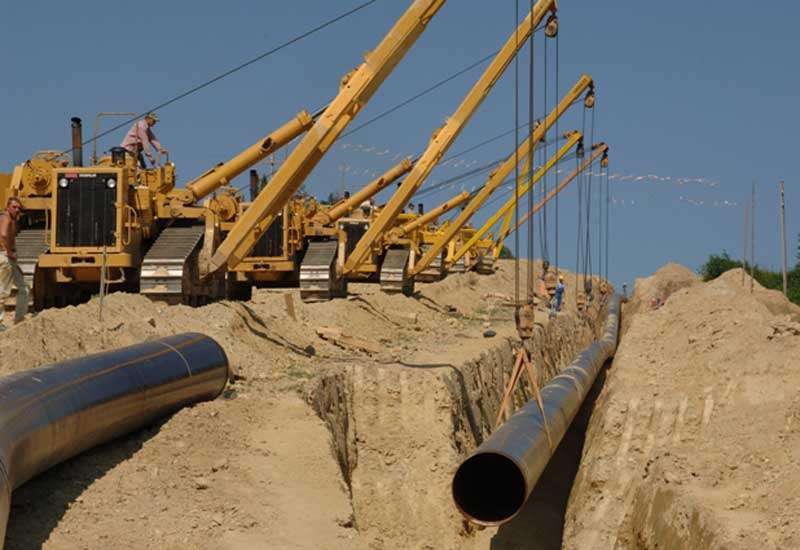Remember the Nabucco Pipeline? In the face of crippling fuel and electricity costs, raging war and the cold turkey the European Union now faces in order to break its Russian gas habit, it is worth recalling there was a serious effort to break the energy gatekeeping stranglehold Vladimir Putin currently holds.
The Nabucco story is one of several in understanding the energy, competition and foreign policy incompetence and negligence by some EU and member state leaders that not only ignored the threat of Russian gas dependence over the past eight years but let the problem expand. Among the most guilty is the European Commission led by former President Jean-Claude Juncker and his cabinet chief Martin Selmayr, both of whom ran interference for the German government on the issue.
Competition Commissioner Margrethe Vestager also gets her fair share of the blame for ignoring a gatekeeper that for more than a decade consistently used its monopoly as a crippling political and economic weapon – a reality that now poses an existential threat to thousands of businesses and a dramatic GDP decline in the coming year or two.
For the uninitiated, the Nabucco Pipeline was a bold project dating back to 2002 and was designed to be a multi-pronged transport network for importing natural gas to the EU from Central Asia and the Near East, including Iraq. Named after the 1840 Giuseppe Verdi opera that dramatized the plight of Jews escaping the Babylon king Nebucadnezzar, the Nabucco Pipeline was envisioned as a modern day liberation from another ruthless despot.
Former European Commission President Jose Manuel Barroso became a zealous supporter of Nabucco in the midst of his two-term role at the helm of the EU executive body that began in 2004. Why? Because he and other Commission officials, including his Energy Commisioner Andris Pielbags, had in 2008 and 2009 spent months dealing with the standard prevarication and blackmail tactics used by Putin and his Gazprom gatekeeping puppets.
At the time Putin was demanding Ukraine pay an extorionate rate for gas it imported from Russia via Soviet Union legacy pipelines. If Ukraine did not pay up then the taps would be turned off, including the millions of cubic meters of gas passing through the same pipelines destined for eastern and central EU member states. Thus it was left to the European Commission to prevent this calamity. After a plethora of marathon negotiating sessions, Barroso and his team announced an agreement numerous times only to find out Putin reneged. In 2009 millions of EU citizens spent more than a month without heat in the midst of a frigid winter.
Understanding that Putin should never be trusted again, Barroso took the lead in finding a gas source for Nabucco to ensure it moved beyond the drawing board. He made a personal visit to the Azerbaijan capital Baku and signed a deal he insisted was the turning point both for Nabucco and the reduction of Russian gas dependence.
Russian manipulation
So what happened? It is a complicated story worthy of a few more Verdi operas. But in a nutshell there was first and foremost the typical Russian political and market manipulation. Putin was determined to torpedo Nabucco and boost Gazprom's EU gas market dominance via a competing pipeline called South Stream. It was designed to send gas to the southern part of the EU. Like Nord Stream 1, which had just opened, South Stream would also by-pass Ukraine and give Putin enhanced blackmail powers over his western neighbor.
Aiding and abetting the typical Russian skullduggery was the usual counter productive competition among EU member states. National interests, including contracts for champion energy and construction companies, trumped over all EU interests in what had become known as the "Southern Gas Corridor'' for routing new gas sources to Greece, Italy and beyond.
The fateful Nabucco blow came when British Petroleum, which had a contract to develop a massive Azeri gas field, made a pennywise but geopolitically foolish decision in 2012 to reject Nabucco. Keep that in mind as British Prime Minister Boris Johnson gives his current lectures to the EU about their dependence on Russian gas.
Meanwhile Putin, determined as ever to push through the South Stream project despite new EU single market energy laws preventing an energy supplier such as Gazprom from also controlling pipeline transport and distribution, did an end-run. South Stream was re-routed under the Black Sea to Turkey. Happy to have a money spinner, Turkey then built its own pipeline now known as Turk Stream. It, along with another pipeline called Blue Stream, transports Russian gas into the Balkans and onwards to the EU - where South Stream was due to arrive.
Eventually another Southern Gas Corridor alternative to Nabucco known as the Trans Adriatic Pipeline was agreed. It finally opened in 2020 but due to various political machinations and environmental protests, it brings approximately one third the amount of gas from central Asia compared to what was slated for Nabucco. More important it barely put a dent in Russian gas dependence.
The collapse of Nabucco and the 2014 Russian invasion of Crimea were key reasons Barroso, along with Baltic and Eastern European countries, warned Juncker when he assumed the Commission helm of the urgent need to address the EU economic and security risks posed by Russian gas dependence.
Clearly that message did not get through. Addressing the lingering economic recession from the euro sovereign debt-banking crisis – compounded by German austerity demands – was the priority for Juncker. In addition many in the European Commission believed that EU-wide gas transport reforms allowing flexible flows had minimized Gazprom's gatekeeping risk. The low price of gas and oil enhanced that view.
Naive EU leaders
Perhaps the most prominent example of the Juncker Commission's naive, low-priority approach to Russian gas dependence came when Competition Commissioner Margrete Vestager closed a market manipulation antitrust case, launched during Barroso's term, against Gazprom with no fine. Vestager insisted that "commitments'' by state-owed Russian gas monopoly were sufficient. The folly of that decision has become all too clear in the last six months as Gazprom manipulated gas supplies and helped push prices to punishing levels as part of Putin's preparation to invade Ukraine.
In the Baltic and Eastern European countries, especially Poland, the 2018 Gazprom decision by the EU competition regulator was seen as a blatant example of Brussel's disregard for their national economic and security interests. Even if the European General Court ruled in February the Gazprom decision was legal, Vestager's critics still insist the same the kind of tax scrutiny, unprecedented fines and enhanced antitrust policing powers she has pursued against digital gatekeepers such as Google, Facebook, Amazon and Apple should have been used against the Russian gas monopoly.
Surely historians will draw some very unflattering conclusions about the economic and geopolitical impact of Vestager's 2018 Gazprom slap on the wrist. They will likely have just as much if not more to say about how the European Commission and the German government, led by former Chancellor Merkel, bought into the charade that Gazprom's $10 billion North Stream II gas pipeline – now a stranded subsea elephant - was simply a "commercial'' operation instead of part of Putin's plans to dominate the EU gas market and rebuild the Soviet Union.
Besides the economic impact linked to the Gazprom "light-touch'' antitrust ruling and the Nord Stream II pipeline decision, both also have been an undercurrent in another ongoing EU crisis: the supremacy of EU treaty law. Populists politicians in some Eastern European countries, especially Poland, insist both cases prove they have the right to snub EU rules when it suits their nationalist agenda, including eliminating an independent judiciary, a free press and LBGTQ rights. Unfortunately that reality, obvious to anyone closely monitoring political and citizen discourse in Eastern Europe in the past two years, has barely made a dent in the Brussels bubble. And it certainly will only become more prominent as the geopolitical impact of the Russian invasion rewrites European history...
So would have a completed Nabucco with multiple non-Russian gas field sources in Central Asia as well as links to liquefied natural gas port platforms changed the course of history? We will never know for sure. But one thing is certain: nobody would be able to accuse the Juncker Commission of ignoring irrefutable evidence that dependence on Gazprom and Putin for more than 40 percent of the bloc's gas needs was nothing less than a disaster waiting to happen.


